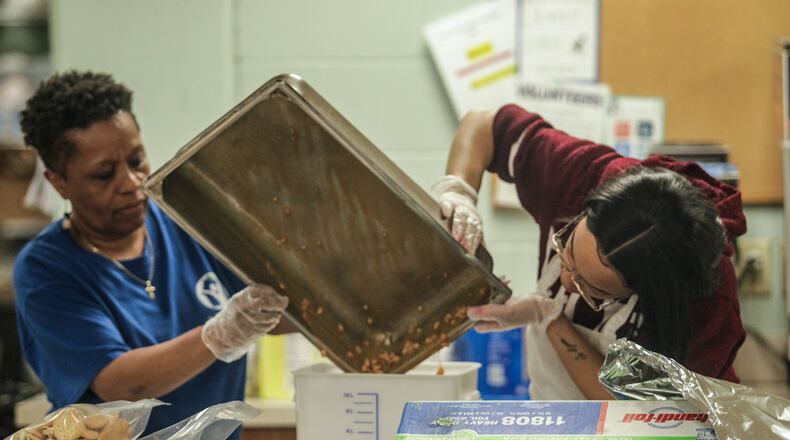MORE: How to help during the coronavirus in the Dayton region
"The Miami Valley is one of the most philanthropic communities in the United States and we believe it will continue to be just that and more," said Tom Maultsby, president and CEO of United Way of the Greater Dayton Area.
More than 672,000 tax filers in the seven-county region are likely to qualify for federal "economic impact" payments of up to $1,200 that should start going out within three weeks.
Local residents who have been laid off or are in dire economic straits should use their stimulus money to pay their rent or mortgages, Dayton Mayor Nan Whaley said, because when the crisis is over, they could face eviction if they fell behind on payments.
The rebate checks won’t stretch far, she said, especially if the pandemic lasts for months. So Whaley encouraged residents to be thoughtful about their housing and food needs for the foreseeable future.
On Thursday, Gov. Mike DeWine's administration issued a new order directing all Ohioans to stay at home except for essential work and errands through May 1.
CORONAVIRUS: Complete coverage from the Dayton Daily News
But Whaley said residents who get a check but might not need the extra cash should consider donating to nonprofits that are part of the local safety net and that are providing vital relief during this emergency, like the Dayton Foodbank, Miami Valley Community Action Partnership and Homefull.
Whaley said she also hopes people will spend money on local businesses to keep the dollars in the community.
Maultsby also hopes that people who can afford it consider donations. United Way and the Dayton Foundation partnered together to create the COVID-19 Response Fund for Greater Dayton, which provides grants to local nonprofit organizations that offer emergency assistance to meet immediate, basic needs of local residents and families, especially vulnerable community members.
MORE: Stimulus checks: Who gets money in Dayton region, and spending advice
Many nonprofit groups are worried that charitable giving they depend on could fall dramatically because of widespread job losses, business closures and other economic disruption caused by the pandemic and efforts to combat it.
During the recession of 2007-2008, United Way saw a nearly $2 million decrease in donations, Maultsby said.
Groups like the Humane Society of Greater Dayton are bracing for big losses: The society expects to lose nearly $285,000 because of the shutdown, which it says will "greatly impact" its budget.
But Maultsby said people in the region take care of their neighbors, and he believes many will step up during this emergency.
Intense demand for assistance
Rebate recipients who are financially stable and might otherwise save the stimulus money should consider donating to a food bank or other local charities in high demand, said Richard Stock, director of the Business Research Group (BRG) at the University of Dayton.
“There are many charities that have needs right now and those needs are exploding,” Stock said.
MORE: Coronavirus: Area workers question essential vs nonessential
Even before the COVID-19 outbreak, Ohio's foodbanks last year provided take-home groceries to more than 1.6 million Ohioans and served 15 million hot meals, according to the Ohio Association of Foodbanks.
But now, more than 468,400 Ohioans have applied for unemployment benefits in two weeks alone, which far exceeds the total number of jobless claims filed in all of 2019, according to state data released Thursday.
More than 25,000 people in the seven-county region applied for unemployment benefits in the week ending March 21, and that was before the stay-at-home order was issued that resulted in many businesses closing.
Foodbank workers and volunteers are working longer hours and food banks’ operating costs are soaring at a time when traditional fundraising events have been cancelled because of the stay-at home order.
The Ohio Association of Foodbanks is seeking $25 million in emergency state funding to address the huge surge in demand on food distribution programs.
Locally, the Dayton Foodbank recently saw seen a 250% increase in drive-through distributions.
Under normal circumstances, the organization serves about 175 families on a typical day at its drive-through. Right now, 400 to 450 families are picking up food, many of whom are new to the program.
St. Vincent de Paul of Dayton says right now it costs about $20,000 per week to put 80 "at-risk guests" in hotel rooms to maintain social distancing at its two shelters.
That’s an expensive temporary solution, and it is unclear how many people will need to be moved into satellite housing and how long they will have to stay there, said Helen Fahey director of mission advancement with St. Vincent de Paul Society of Dayton.
“We project that operationally, over the next months, some of our costs will double and some will triple, and our financial resources are being drained,” Fahey said. “But we must do whatever we possibly can to ensure everyone is sheltered, and to keep everyone as safe as possible to flatten the infection curve so our hospitals do not become overwhelmed.”
Local foundations and more than 500 individuals donors have provided funding to help St. Vincent de Paul through several weeks of increased COVID-related sheltering costs, Fahey said.
But the organization says it needs to be prepared for an extended period of increased costs and demand for emergency services.
“We ask that anyone able to support our many ministries donate online at stvincentdayton.org, as the need is still great in addressing this crisis and its aftermath,” Fahey said.
Some community members have pledged to spend their stimulus payments to help local nonprofits and businesses.
Dayton residents Marshall Weil and Gisselle Pereira say so far they are fortunate to not be financially impacted by the fallout from the coronavirus. They started a campaign asking people who can afford it to donate half their stimulus checks to charity and spend the other half at local businesses.
About the Author

